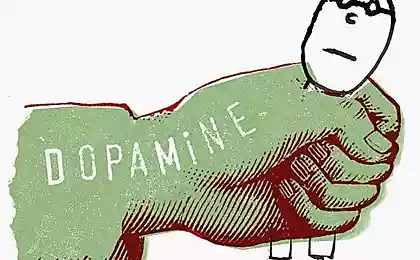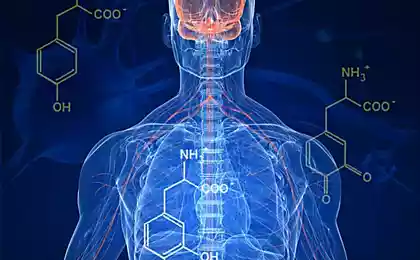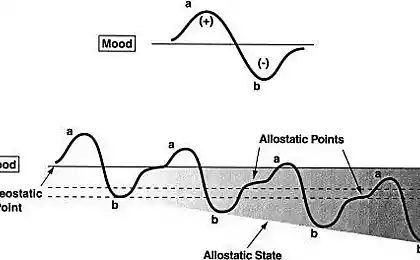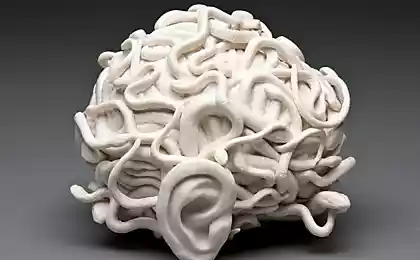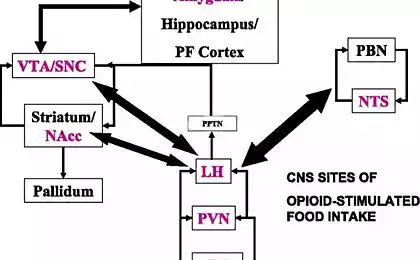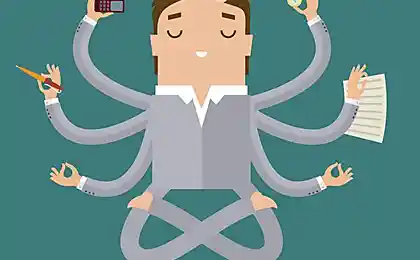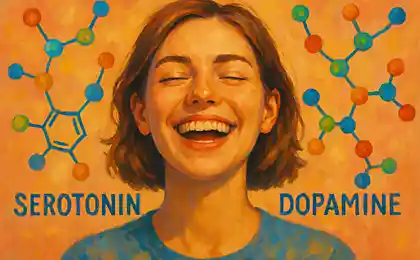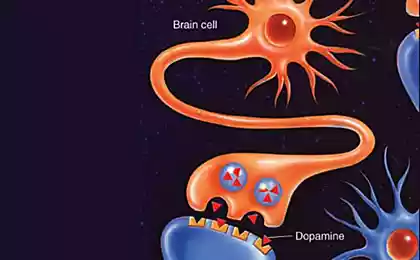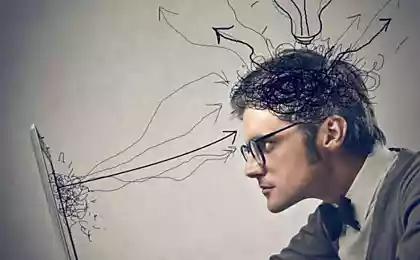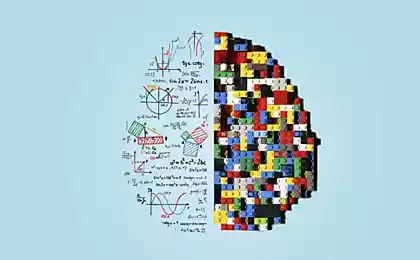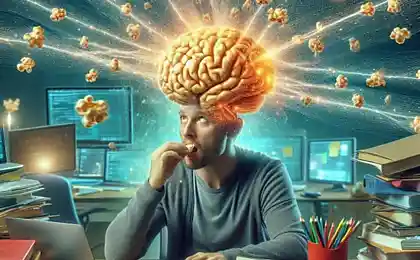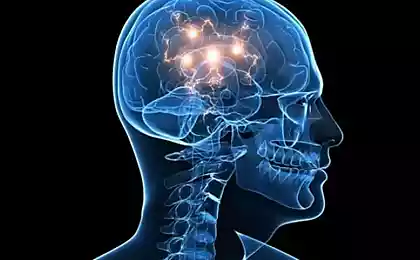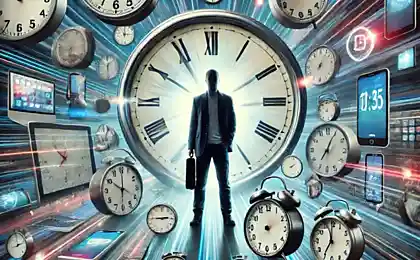749
Dopamine and invisible drugs: haste, haste, restlessness, multitasking
Today we will talk about psychological drugs: behavior that causes significant surge of dopamine. Activity is a big deal when it is associated with the integrity of your liceti and goes inside. But very often our activity is only a mask, a cover, a syringe to squeeze out a few drops of dopamine. Activity is a drug in itself. Every time we perform some small task (sending emails, writing a text message or post to social networks), our body produces the hormone dopamine. It is an important part of the "reward system" of the brain, therefore, we willingly undertake new challenges that give us instant gratification.
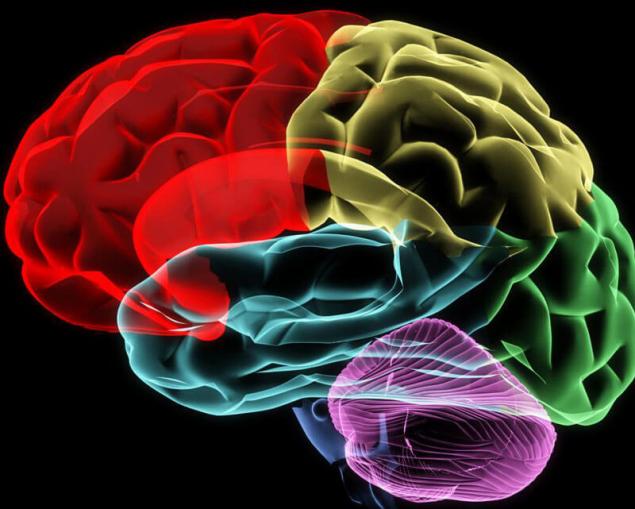
I want to ask you a question: “Have something in common sitting Vkontakte, the smell of freshly cooked Apple pie and going to a night club?“ I think that these things are in no way related to each other? Think nothing, no? And the total is still there. It's the anticipation of rewards.
When you sit Vkontakte for several hours, you anticipate that someone will write a message, or someone like under just made a photo (of course worthless from the point of view of professional photographers).
When you can smell freshly baked Apple pie, you anticipate the taste of this food, you begin to flow salivating. Even if you're not hungry, you still want to try a piece.
When you go to a nightclub, you expect to meet some girl and Wake up next to her. You don't care what the last 50 similar trips to this place were not successful, and you fall asleep at five in the morning hugging my pillow. But the expectation of rewards in the form of ‘girls’ makes you go back again and again. Rate their dependence on employment. According to the Manual, we are dependent on any substance, if the test at least three of the following seven symptoms:
1. addictive - need more to achieve the same effect
example: you buzz from employment, so if costheta themselves frustrated, even stronger than himself a bit. Over time you'll need more of it to feel normal.
2. withdrawal - negative feelings at the termination
example: it is difficult to pass the "couch test": simply relaxed without a book and be by myself for half an hour, starts itch, "employment": pojavljatsja the feeling that you do not have time, not finish, need test or not to miss.
3. misuse - drinking more than intended
example: initially you thought that this would be one project but it turned out that he turned into six and you pull all six.
4. loss of control - a significant change of behavior caused by the substance
example: you start to feel better, being engaged by the ears and feel uncomfortable while in a relaxed state
5. exceptional effort to obtain the output beyond the reasonable to get the substance
example: you begin work, just to work, pull the projects that do not have to you direct relationships, volunteered to take on someone else's work.
6. over-prioritization - use of the substance at the expense of other, more important activities
example: you put the current work to the detriment of its values and long-term plans
7. ignoring negative consequences - continued use despite highly negative consequences
example: your employment and suetlivosti suffering your health and the people around you.
There are some more specific symptoms, such as a digital alarm and a narrowing of the planning horizon.
The narrowing of the planning horizon. Unfortunately, the above limitation in multitasking entails the following problem — the people who are forced to combine hundreds of short-term Affairs, is shrinking "planning horizon". Planning horizon — an economic term describing the period during which it is expected to implement a plan or programme of action. In a General sense under the planning horizon is considered to be the period from the adoption of the plan until its implementation.
Digital alarm. Have you ever had so that you for example are reading an interesting article, and suddenly open your mail and begin to read the letters. Or turn the phone to see if there are new messages. The feeling to concentrate on one thing does not give you some kind of internal timer that counts down a certain "quantum" of time, and after this time causes you to go to the next task (regardless if you finished the previous one).
The rush and haste of Dependency work is the result of hormonal imbalance in our brain and has nothing to do with the real situation. Perhaps you are familiar with this: after a long working week, finally the weekend comes. Time for rest, relaxation and to do nothing at all. At the same time on Saturday morning — before 9 o'clock — you have already planned three meetings, ordered a new wardrobe at IKEA and take the other four cases that provide employment for the whole weekend.
Or maybe, you could happen something like this: 8 am — and you are already in office. On your Desk a list of four items is an important business for today. And then the phone rings, you pick it up... and before you managed to understand something, there comes 5pm and time to go home. Your list is still on the table — you don't even have time to touch it, not to mention the fact that to do something. Both of these examples illustrate an "addiction to doing" — a deep-rooted human habit that is associated with an imbalance of the chemicals in our brain. The main role in this drama is played by the dopamine. Dopamine is a drug that is easily addictive and is naturally produced in our brain in response to reward. And then we have a short feeling of pleasure, reward and relaxation...
Dopamine is the main driving force that causes our continued employment. At the time, how do you organize three meetings, bought a new IKEA wardrobe and read the strip on Facebook, the dopamine is produced. We feel good about ourselves. But only for a short time. Then the brain requires a new dose. More action! For a long time and we run in circles "action—reward" ... It is an addiction to doing in action. Sounds familiar, doesn't it? As a consequence, depending on the work we are constantly chasing short-term wins. We all the time pay attention to small details, which completely lose sight of the larger purpose. If you are reading this and are not sure if this refers to you, we propose a simple test.
Next time when you come to the office early in the morning, before you start, you just sit and look out the window or on the screen of your computer. Don't do anything. Don't talk. Not solve any problems. Just sit doing nothing for three minutes. If this test seems difficult, if doing nothing is a real challenge for you, you feel concern and desire to do something — you are in some degree dependent on the actions of. Fortunately, there is a solution.
Employment is modern laziness
Dependence on work is an advanced kind of laziness. We captured a haunting cases. The more engaged we become, the more we avoid thinking about life and death. When we are constantly busy with some things — important or not — we avoid meeting with life. We keep a safe and comfortable distance from those questions that are sometimes hard to wonder whether we chose a career? We spend enough time with their children? Filled our life with meaning?
Being busy is a choice. We all have deadlines, projects, and various cases, but we also have the freedom to become dependent on work, employment, or laziness, or just watch as we do a lot of these cases. It is a choice. And the ability to make that choice is a consequence of the development of clear mind, free from dependence on doing. Next time when you feel very busy, pause for a moment and observe: What keeps you in this state? Is it worth it? Maybe something should be released? Your mind is so busy by their very nature — or is he just pretending to be? Multitasking = problems with concentration
Yes, because it is difficult to resist. Modern technology has made it very easy and simple multitasking. Smartphones have turned into an analog multitool, Swiss army knife, they can do anything. Probably, there is no longer a purpose for which you would not have written a mobile app.
In such conditions it is difficult to resist the temptation not to benefit from the "liberated" thanks to the clever-gadget time. For example, listen to music and chat with friends while riding the subway or bus. Or liking posts on Facebook or myspace sitting with his other half in a cafe. And then suddenly something important is written, and you are in the subject.
I must say that our brain is such a situation is really like. It turns out that when we are immersed in multitasking, the brain produces dopamine. In fact, is one of the main physiological mechanisms of reward for what you do so much at a time. In addition, our attention can easily draw something bright, shining, new. We are very similar to forty. So the brain rewards us with a dose of dopamine every time we turn a working paper and climb to check mail. And if there are new letters appeared, the reward becomes more generous. And we very quickly become addicted.
Earl Miller, a scientist from the Massachusetts neurological Institute, notes that "our brain is designed to concentrate on one thing. The fact that many people used to consider multitasking is actually rapid switching of attention from one task to another."
Multitasking people find it hard to gather my thoughts, filter out unnecessary information — all of this degrades our performance. Participants in the study, University of London, during the execution of multiple tasks simultaneously, demonstrated a drop in IQ. Scary to imagine, but this figure was almost equal to the amount of people who are constantly not getting enough sleep or Smoking marijuana.
During the study, Sussex univeristate the scientists scanned the brains of people who were simultaneously employed by several devices, for example, texting while watching TV. It was found that frequent use of multiple gadgets at once reduces the density of gray matter in the anterior cingulate cortex. This area manages the functions of knowledge and control over emotions.
In any case, multitasking is not a great skill which you should write in your resume, but rather a bad habit that you should get rid of.
Multitasking also causes great fatigue. Takes more energy to switch from one job to another. But trying to focus less. Why people who organize their time in such a way as to focus more on the work itself, and not to try to do a bunch of things at once will not only get more done, but get tired much less. (The Organized Mind by Daniel J. Levitin).
Busyness and bustle that is the prefrontal area of the brain are involved when performing several tasks simultaneously. Actually she is not engaged in two tasks at once, and just quickly switches from one to another. When you write an email, check work schedule, and listen to messages left on the phone, the prefrontal cortex of the brain quickly switches your attention from the PC to the notebook, then at the phone again to the computer. This high-speed activity fuels dopamine, the hormone of a "family" of adrenaline. Multitasking gives us confidence in our own intelligence and gives the feeling that we do more. Our "Manager" works well, and we feel alive!
When you work on several tasks that you are doing? You are not in a state of quiet contemplation, not spend time in nature, do not share time with loved ones. But this activity stimulates the production of serotonin — the brain chemicals responsible for feeling of satisfaction and supervising the production of adrenaline. In the prefrontal region of the brain has many receptors of serotonin and dopamine. This area of the brain aktiviziruyutsya during meditation, which is the very essence of sustained attention.
Why, then, take on too many things at once, if it's less productive? Well, I guess, performing some very simple tasks at the same time, we become still more productive. It is unlikely that people talking on the phone is worse than pulling plates from the dishwasher.
And what happens when we perform more complex tasks using computers and phones? The most likely answer: multitasking provokes a surge akin to epinephrine, dopamine, which you feel fresh and active as if actually manage to do more in less time. Conscious multitasking involves the strategic use of stimuli of greater or lesser intensity. In the fifth Chapter concrete examples, you learn its basic principles.
For multi-tasking has its time. When your "leader" is not particularly busy, additional stimulation in the form of several simultaneous actions will benefit. Despite your busy schedule you captured the effect of dopamine, does not care about how to restore the balance of chemical elements during the serotonin pause, and lose not only the efficiency of their work. Connection in your brain responsible for sustained attention, weaken, and eventually be harder to make yourself focus on the problem or learn new things. The constant spraying of attention, switching from task to task distracts us from accomplishing one of the main case. Moreover, over time many people become less able for a long time to concentrate on something. published
Sources:
vnimatelnost.com/2015/10/30/are-you-addicted-to-doing/
womo.com.ua/mnogozadachnost-ubivaet-vash-mozg/
www.shapovalov.org/news/2014-11-26-2995 http://utmagazine.ru/posts/10151-himiya-v-tvoey-golove
Author: Andrei Beloveshkin P. S. And remember, only by changing their consumption — together we change the world! ©
Join us in Facebook , Vkontakte, Odnoklassniki
Source: www.beloveshkin.com/2015/11/dofamin-i-nevidimye-narkotiki-speshka-toroplivost-suetlivost-mnogozadachnost.html#more

I want to ask you a question: “Have something in common sitting Vkontakte, the smell of freshly cooked Apple pie and going to a night club?“ I think that these things are in no way related to each other? Think nothing, no? And the total is still there. It's the anticipation of rewards.
When you sit Vkontakte for several hours, you anticipate that someone will write a message, or someone like under just made a photo (of course worthless from the point of view of professional photographers).
When you can smell freshly baked Apple pie, you anticipate the taste of this food, you begin to flow salivating. Even if you're not hungry, you still want to try a piece.
When you go to a nightclub, you expect to meet some girl and Wake up next to her. You don't care what the last 50 similar trips to this place were not successful, and you fall asleep at five in the morning hugging my pillow. But the expectation of rewards in the form of ‘girls’ makes you go back again and again. Rate their dependence on employment. According to the Manual, we are dependent on any substance, if the test at least three of the following seven symptoms:
1. addictive - need more to achieve the same effect
example: you buzz from employment, so if costheta themselves frustrated, even stronger than himself a bit. Over time you'll need more of it to feel normal.
2. withdrawal - negative feelings at the termination
example: it is difficult to pass the "couch test": simply relaxed without a book and be by myself for half an hour, starts itch, "employment": pojavljatsja the feeling that you do not have time, not finish, need test or not to miss.
3. misuse - drinking more than intended
example: initially you thought that this would be one project but it turned out that he turned into six and you pull all six.
4. loss of control - a significant change of behavior caused by the substance
example: you start to feel better, being engaged by the ears and feel uncomfortable while in a relaxed state
5. exceptional effort to obtain the output beyond the reasonable to get the substance
example: you begin work, just to work, pull the projects that do not have to you direct relationships, volunteered to take on someone else's work.
6. over-prioritization - use of the substance at the expense of other, more important activities
example: you put the current work to the detriment of its values and long-term plans
7. ignoring negative consequences - continued use despite highly negative consequences
example: your employment and suetlivosti suffering your health and the people around you.
There are some more specific symptoms, such as a digital alarm and a narrowing of the planning horizon.
The narrowing of the planning horizon. Unfortunately, the above limitation in multitasking entails the following problem — the people who are forced to combine hundreds of short-term Affairs, is shrinking "planning horizon". Planning horizon — an economic term describing the period during which it is expected to implement a plan or programme of action. In a General sense under the planning horizon is considered to be the period from the adoption of the plan until its implementation.
Digital alarm. Have you ever had so that you for example are reading an interesting article, and suddenly open your mail and begin to read the letters. Or turn the phone to see if there are new messages. The feeling to concentrate on one thing does not give you some kind of internal timer that counts down a certain "quantum" of time, and after this time causes you to go to the next task (regardless if you finished the previous one).
The rush and haste of Dependency work is the result of hormonal imbalance in our brain and has nothing to do with the real situation. Perhaps you are familiar with this: after a long working week, finally the weekend comes. Time for rest, relaxation and to do nothing at all. At the same time on Saturday morning — before 9 o'clock — you have already planned three meetings, ordered a new wardrobe at IKEA and take the other four cases that provide employment for the whole weekend.
Or maybe, you could happen something like this: 8 am — and you are already in office. On your Desk a list of four items is an important business for today. And then the phone rings, you pick it up... and before you managed to understand something, there comes 5pm and time to go home. Your list is still on the table — you don't even have time to touch it, not to mention the fact that to do something. Both of these examples illustrate an "addiction to doing" — a deep-rooted human habit that is associated with an imbalance of the chemicals in our brain. The main role in this drama is played by the dopamine. Dopamine is a drug that is easily addictive and is naturally produced in our brain in response to reward. And then we have a short feeling of pleasure, reward and relaxation...
Dopamine is the main driving force that causes our continued employment. At the time, how do you organize three meetings, bought a new IKEA wardrobe and read the strip on Facebook, the dopamine is produced. We feel good about ourselves. But only for a short time. Then the brain requires a new dose. More action! For a long time and we run in circles "action—reward" ... It is an addiction to doing in action. Sounds familiar, doesn't it? As a consequence, depending on the work we are constantly chasing short-term wins. We all the time pay attention to small details, which completely lose sight of the larger purpose. If you are reading this and are not sure if this refers to you, we propose a simple test.
Next time when you come to the office early in the morning, before you start, you just sit and look out the window or on the screen of your computer. Don't do anything. Don't talk. Not solve any problems. Just sit doing nothing for three minutes. If this test seems difficult, if doing nothing is a real challenge for you, you feel concern and desire to do something — you are in some degree dependent on the actions of. Fortunately, there is a solution.
Employment is modern laziness
Dependence on work is an advanced kind of laziness. We captured a haunting cases. The more engaged we become, the more we avoid thinking about life and death. When we are constantly busy with some things — important or not — we avoid meeting with life. We keep a safe and comfortable distance from those questions that are sometimes hard to wonder whether we chose a career? We spend enough time with their children? Filled our life with meaning?
Being busy is a choice. We all have deadlines, projects, and various cases, but we also have the freedom to become dependent on work, employment, or laziness, or just watch as we do a lot of these cases. It is a choice. And the ability to make that choice is a consequence of the development of clear mind, free from dependence on doing. Next time when you feel very busy, pause for a moment and observe: What keeps you in this state? Is it worth it? Maybe something should be released? Your mind is so busy by their very nature — or is he just pretending to be? Multitasking = problems with concentration
Yes, because it is difficult to resist. Modern technology has made it very easy and simple multitasking. Smartphones have turned into an analog multitool, Swiss army knife, they can do anything. Probably, there is no longer a purpose for which you would not have written a mobile app.
In such conditions it is difficult to resist the temptation not to benefit from the "liberated" thanks to the clever-gadget time. For example, listen to music and chat with friends while riding the subway or bus. Or liking posts on Facebook or myspace sitting with his other half in a cafe. And then suddenly something important is written, and you are in the subject.
I must say that our brain is such a situation is really like. It turns out that when we are immersed in multitasking, the brain produces dopamine. In fact, is one of the main physiological mechanisms of reward for what you do so much at a time. In addition, our attention can easily draw something bright, shining, new. We are very similar to forty. So the brain rewards us with a dose of dopamine every time we turn a working paper and climb to check mail. And if there are new letters appeared, the reward becomes more generous. And we very quickly become addicted.
Earl Miller, a scientist from the Massachusetts neurological Institute, notes that "our brain is designed to concentrate on one thing. The fact that many people used to consider multitasking is actually rapid switching of attention from one task to another."
Multitasking people find it hard to gather my thoughts, filter out unnecessary information — all of this degrades our performance. Participants in the study, University of London, during the execution of multiple tasks simultaneously, demonstrated a drop in IQ. Scary to imagine, but this figure was almost equal to the amount of people who are constantly not getting enough sleep or Smoking marijuana.
During the study, Sussex univeristate the scientists scanned the brains of people who were simultaneously employed by several devices, for example, texting while watching TV. It was found that frequent use of multiple gadgets at once reduces the density of gray matter in the anterior cingulate cortex. This area manages the functions of knowledge and control over emotions.
In any case, multitasking is not a great skill which you should write in your resume, but rather a bad habit that you should get rid of.
Multitasking also causes great fatigue. Takes more energy to switch from one job to another. But trying to focus less. Why people who organize their time in such a way as to focus more on the work itself, and not to try to do a bunch of things at once will not only get more done, but get tired much less. (The Organized Mind by Daniel J. Levitin).
Busyness and bustle that is the prefrontal area of the brain are involved when performing several tasks simultaneously. Actually she is not engaged in two tasks at once, and just quickly switches from one to another. When you write an email, check work schedule, and listen to messages left on the phone, the prefrontal cortex of the brain quickly switches your attention from the PC to the notebook, then at the phone again to the computer. This high-speed activity fuels dopamine, the hormone of a "family" of adrenaline. Multitasking gives us confidence in our own intelligence and gives the feeling that we do more. Our "Manager" works well, and we feel alive!
When you work on several tasks that you are doing? You are not in a state of quiet contemplation, not spend time in nature, do not share time with loved ones. But this activity stimulates the production of serotonin — the brain chemicals responsible for feeling of satisfaction and supervising the production of adrenaline. In the prefrontal region of the brain has many receptors of serotonin and dopamine. This area of the brain aktiviziruyutsya during meditation, which is the very essence of sustained attention.
Why, then, take on too many things at once, if it's less productive? Well, I guess, performing some very simple tasks at the same time, we become still more productive. It is unlikely that people talking on the phone is worse than pulling plates from the dishwasher.
And what happens when we perform more complex tasks using computers and phones? The most likely answer: multitasking provokes a surge akin to epinephrine, dopamine, which you feel fresh and active as if actually manage to do more in less time. Conscious multitasking involves the strategic use of stimuli of greater or lesser intensity. In the fifth Chapter concrete examples, you learn its basic principles.
For multi-tasking has its time. When your "leader" is not particularly busy, additional stimulation in the form of several simultaneous actions will benefit. Despite your busy schedule you captured the effect of dopamine, does not care about how to restore the balance of chemical elements during the serotonin pause, and lose not only the efficiency of their work. Connection in your brain responsible for sustained attention, weaken, and eventually be harder to make yourself focus on the problem or learn new things. The constant spraying of attention, switching from task to task distracts us from accomplishing one of the main case. Moreover, over time many people become less able for a long time to concentrate on something. published
Sources:
vnimatelnost.com/2015/10/30/are-you-addicted-to-doing/
womo.com.ua/mnogozadachnost-ubivaet-vash-mozg/
www.shapovalov.org/news/2014-11-26-2995 http://utmagazine.ru/posts/10151-himiya-v-tvoey-golove
Author: Andrei Beloveshkin P. S. And remember, only by changing their consumption — together we change the world! ©
Join us in Facebook , Vkontakte, Odnoklassniki
Source: www.beloveshkin.com/2015/11/dofamin-i-nevidimye-narkotiki-speshka-toroplivost-suetlivost-mnogozadachnost.html#more
Childbirth is like the judgment of God.
The passive aggressor: avenger of Evil behind a mask of sadness
